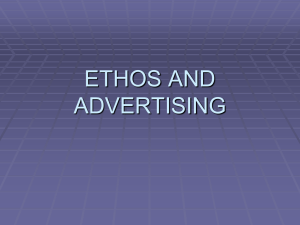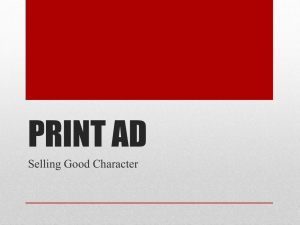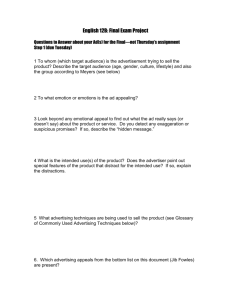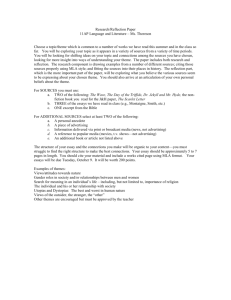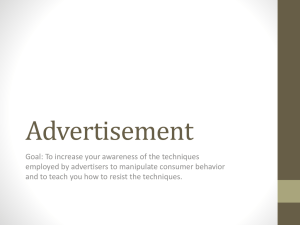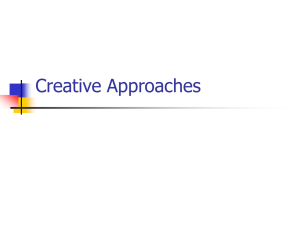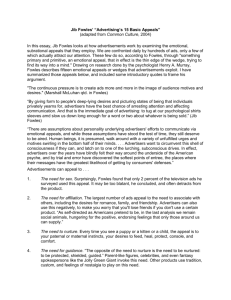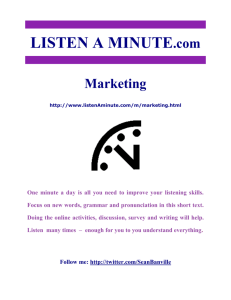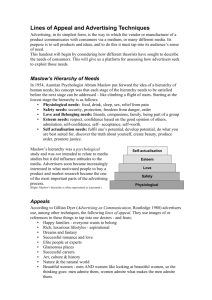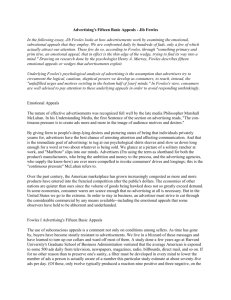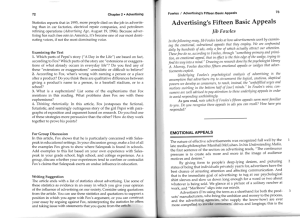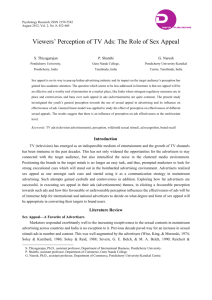Advertising:
advertisement
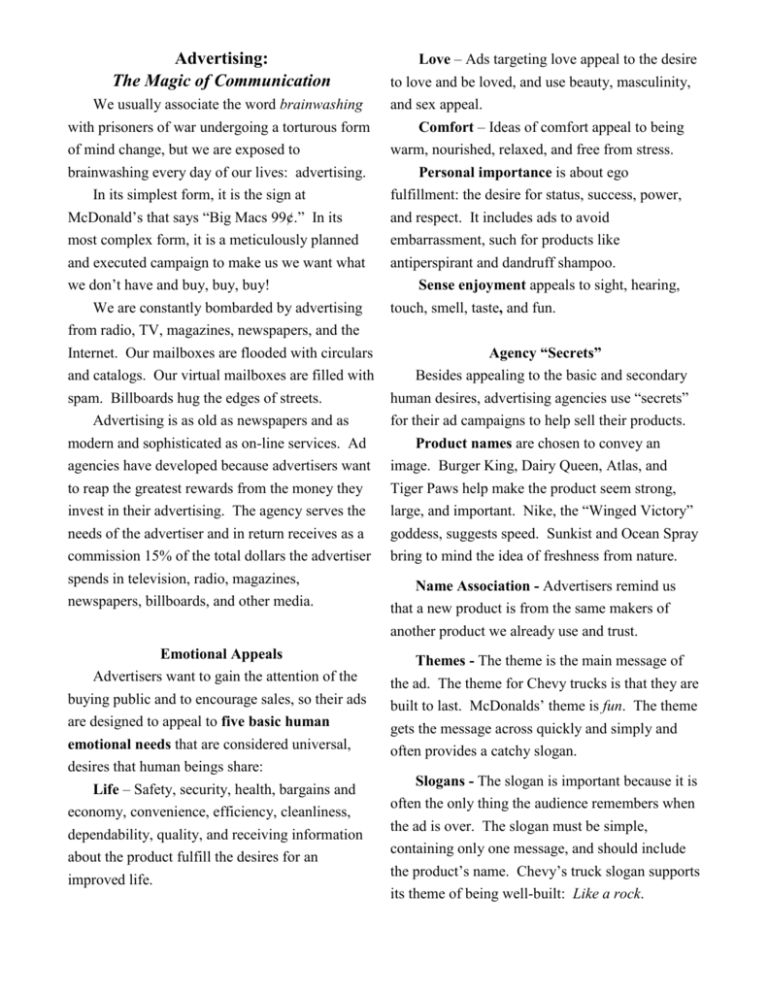
Advertising: The Magic of Communication Love – Ads targeting love appeal to the desire to love and be loved, and use beauty, masculinity, We usually associate the word brainwashing with prisoners of war undergoing a torturous form of mind change, but we are exposed to brainwashing every day of our lives: advertising. In its simplest form, it is the sign at McDonald’s that says “Big Macs 99¢.” In its most complex form, it is a meticulously planned and executed campaign to make us we want what we don’t have and buy, buy, buy! We are constantly bombarded by advertising and sex appeal. Comfort – Ideas of comfort appeal to being warm, nourished, relaxed, and free from stress. Personal importance is about ego fulfillment: the desire for status, success, power, and respect. It includes ads to avoid embarrassment, such for products like antiperspirant and dandruff shampoo. Sense enjoyment appeals to sight, hearing, touch, smell, taste, and fun. from radio, TV, magazines, newspapers, and the Internet. Our mailboxes are flooded with circulars and catalogs. Our virtual mailboxes are filled with spam. Billboards hug the edges of streets. Advertising is as old as newspapers and as modern and sophisticated as on-line services. Ad agencies have developed because advertisers want to reap the greatest rewards from the money they invest in their advertising. The agency serves the Agency “Secrets” Besides appealing to the basic and secondary human desires, advertising agencies use “secrets” for their ad campaigns to help sell their products. Product names are chosen to convey an image. Burger King, Dairy Queen, Atlas, and Tiger Paws help make the product seem strong, large, and important. Nike, the “Winged Victory” needs of the advertiser and in return receives as a commission 15% of the total dollars the advertiser spends in television, radio, magazines, newspapers, billboards, and other media. goddess, suggests speed. Sunkist and Ocean Spray bring to mind the idea of freshness from nature. Emotional Appeals Advertisers want to gain the attention of the buying public and to encourage sales, so their ads are designed to appeal to five basic human Themes - The theme is the main message of the ad. The theme for Chevy trucks is that they are built to last. McDonalds’ theme is fun. The theme gets the message across quickly and simply and emotional needs that are considered universal, desires that human beings share: Life – Safety, security, health, bargains and economy, convenience, efficiency, cleanliness, dependability, quality, and receiving information about the product fulfill the desires for an improved life. often provides a catchy slogan. Name Association - Advertisers remind us that a new product is from the same makers of another product we already use and trust. Slogans - The slogan is important because it is often the only thing the audience remembers when the ad is over. The slogan must be simple, containing only one message, and should include the product’s name. Chevy’s truck slogan supports its theme of being well-built: Like a rock. Sex Appeal - Because the desire to be loved is one of the strongest emotions, sex appeal is a Scientific Statistics and Polls are used to help convince the consumer which product to purchase. powerful tool. Billion dollar industries from Revlon and Clairol to Levi and Gap use campaigns focused on the desire to attract the opposite sex. Beautiful girls and handsome men sell endless varieties of soaps, soups, and sodas. An actor in a white coat may proclaim that 9 out of 10 dentists recommend that their patients use a particular toothpaste or that the toothpaste reduces cavities by 98%. An actor in coveralls and holding a clipboard may explain which automobile has the best crash test ratings or the best gas mileage. Numbers are used to make products seem beneficial, dependable, and vital. Endorsements or testimonials gain attention and help sell products. Endorsements are made by everyday housewives claiming which detergent is the best and by super athletes raving about hot Color psychology is a relatively new science dogs. Millions of dollars are paid to sports and movie stars to tell us which aftershave, which car, that has changed many ideas about advertising. Color ads sell most products better than black and which beer, and which soft drink to buy. white. Some ads are black and white, using color only for the product being promoted! Studies show that cool colors such as greens and blues produce calm feelings good for cleaning or health care products and hot colors like reds and oranges create excitement that sells sports cars. Humor, Children, and Animals - Most people love to laugh and enjoy looking at cute children and adorable animals. Therefore, ads are full of clever remarks, humorous happenings, and all kinds of kids and animals. Young people identify with such images and older persons remember their own childhood. Promises - Among the promises advertisers make are weight loss, clear skin, more energy, greater sex appeal and eternal youth. (But only promise what you can deliver!) Guarantees allow people to feel safe buying something they have not tried before because they believe they can get their money back if the product does not work or if they do not like it. Special Offers make buyers feel that they are receiving a better value for their money. These incentives include coupons, gifts-with-purchase, quantity discounts, and free samples. A buyer deciding between a Ford and a Dodge may choose the Dodge when she finds out that air conditioning is included at no additional cost this month. Offers with deadlines may spur buyers to action. Plain folks - The person endorsing the product reminds the consumer of someone to be trusted, like a neighbor or grandparent. Bandwagon - Join the crowd. Everyone else is buying this product, and you should, too! Transfer - If you buy this product, you’ll be happy, secure, adventurous, successful, or beautiful - just like the people in the ad. Glittering generalities (puffery) Words like “helps” or “new and improved” are used to impress us, but are unsubstantiated. Think of this as inference without evidence. Although advertisers in the real world use these terms, you should avoid them in your campaigns. As you prepare your ad campaigns, appeal to their emotions and desires of your target audience. Make sure the theme is clear, the slogan is simple and easy to remember, and the jingle is catchy. Use the “secrets” of advertising to help you get your message across and sell your product.

